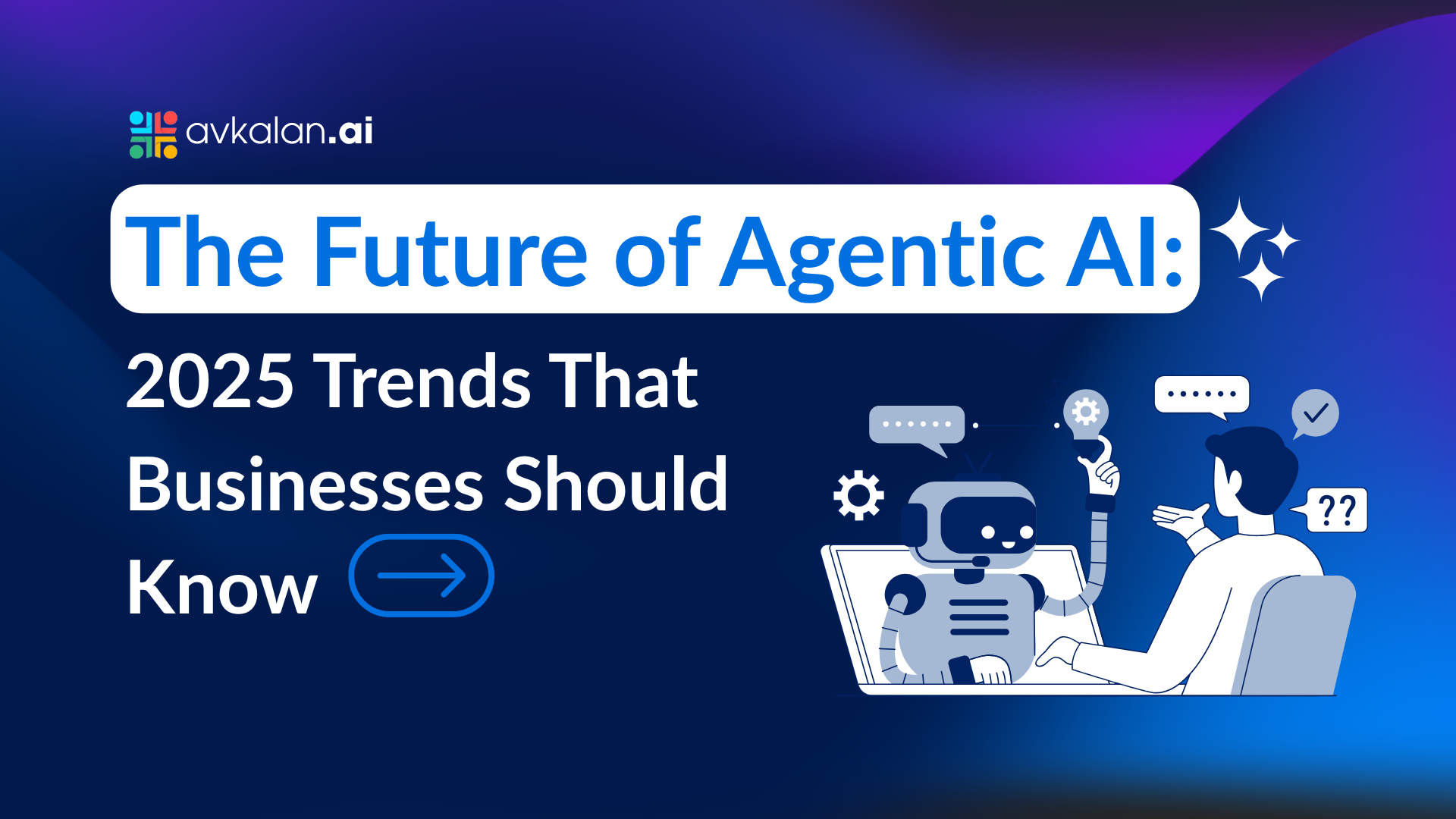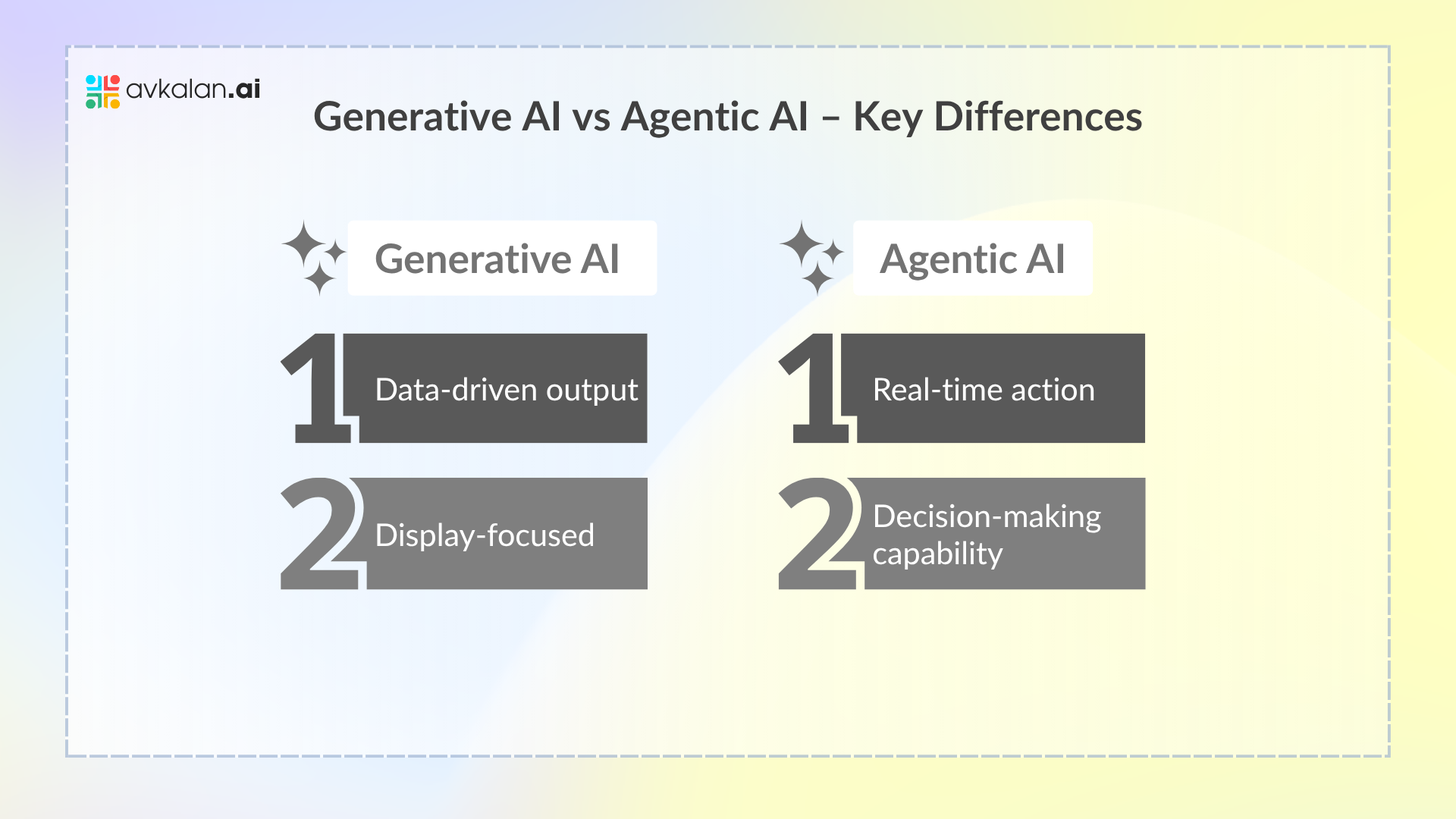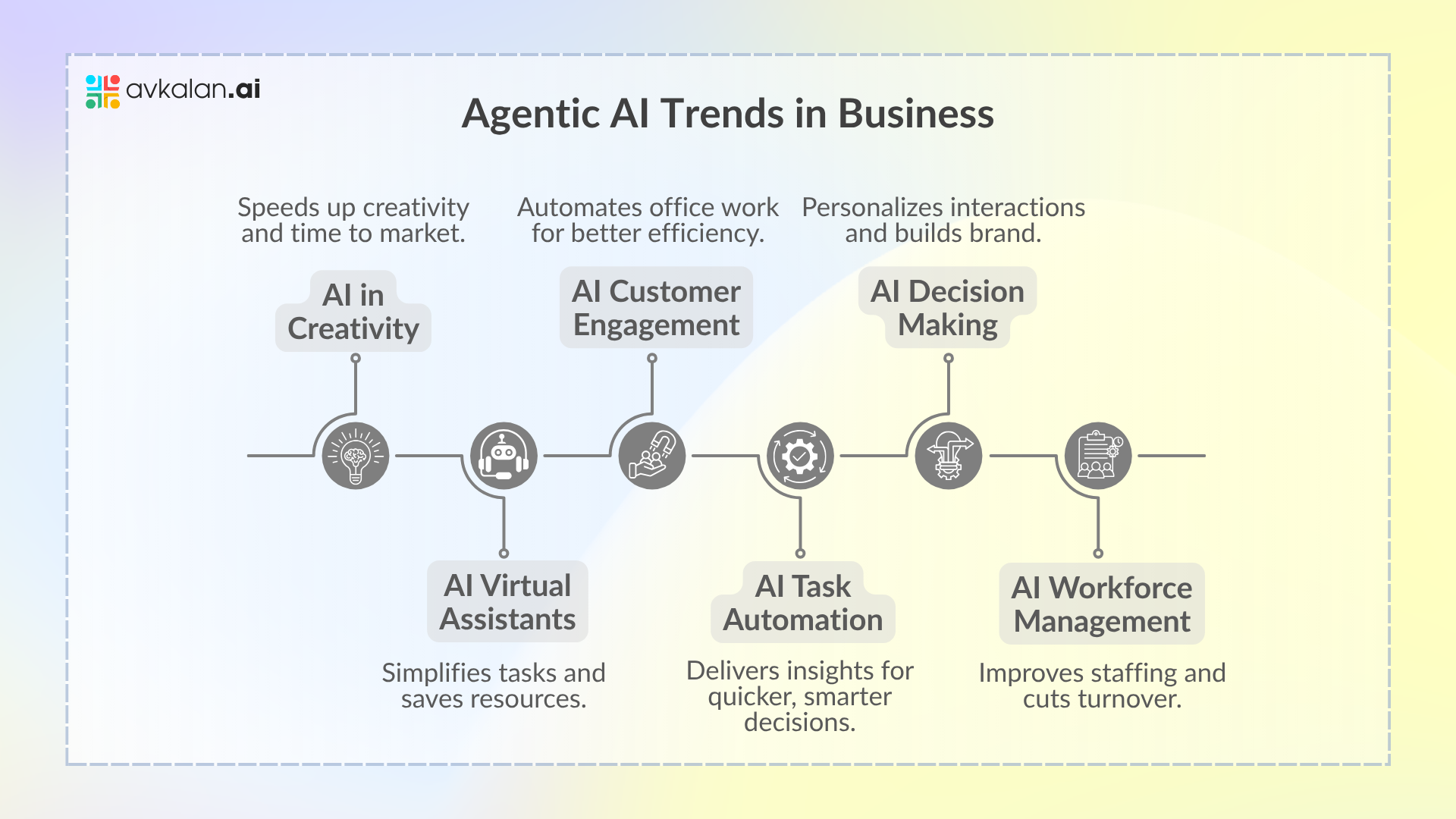
The rapid technological advancement has transformed all business sectors. Agentic AI, the system that takes independent actions within defined limits, has significantly transformed almost all industries. The AI marketplace is likely to grow mostly because of automation in workplaces. AI tools can build new types of work and efficiency from advanced AI-activated decision support to customized learning platforms. By integrating Agentic AI effectively, you can stand out in a crowded marketplace. To do that, you should be aware of the Agentic AI trends that are shaping the future.
Here you will learn Agentic AI trends that businesses should know. But before that, let’s discuss what is Agentic AI and how it differs from Generative AI. Keep reading.
What is Agentic AI?
Agentic AI is a cutting-edge AI system that can take independent actions depending on contextual knowledge and preset objectives. Unlike traditional AI models that work by following instructions, Agentic AI works autonomously, makes decisions, and performs activities with no consistent human efforts. The core values of Agentic AI tools are their abilities to boost manual efforts and automation in certain industries, such as personalized CX, cybersecurity, and workforce management. So, AI keeps advancing and Agentic AI turns out to be a big change in restructuring industries and transforming operations.
Find below are the key features of Agentic AI:
-
- Autonomy : Help in making decisions depending on preset goals and performing tasks as required
- Proactivity : Outline challenges and opportunities to take actionable steps in addressing them.
- Adaptability : Learn from data and experiences to modify actions in the changing environment
Generative AI vs Agentic AI – Key Differences

Generative AI functions with upcoming new elements depending on the same patterns learned from data. This type of AI does not function in the world. However, it delivers outcomes in the form of music, images, text,, or coding in reply to the inputs. It focuses on displaying data, which is similar to what has been trained without deleting input from the setup, like ChatGPT, which displays text.
On the contrary, Agentic AI is built to take actions in a dynamic setup to fulfill certain goals. It helps in making smart decisions, planning, and adapting depending on the environment’s feedback. Autonomies and goals drive such a type of AI with real-time data to identify and fix issues. Such types of cases are smart home automation, manufacturing robotic products, and self-driving cars.
Agentic AI Trends Shaping the Future of the Business World
Here are the Agentic AI trends that businesses can’t afford to miss in 2025:

- AI in Human Creativi : Creative professionals use an “intelligent agent” or a type of AI to level up their creativity. AI can boost human creativity by performing all the brainstorming and technical activities, be it building marketing campaigns or creating product design/artwork.This trend can eliminate the requirement of creative professionals and allow them to quickly experiment and repeat the same. AI-activated companies implementing creativity usually discover they can decrease the time to promote the latest products and services, which helps them stay ahead of their competitors.
- AI-Activated Virtual Assistants : Virtual Assistants are doing much more than playing music and setting reminders. They have upgraded to be complicated tools, which encourage many professional activities. Most of such AI-activated assistants may write emails, fix meetings, manage operations for all teams, and track project time limits. AI bots may solve customer issues, answer their queries, and ease client transitions to human operators in customer service.Many businesses are expected to implement AI-activated virtual assistants by 2025 to boost overall efficiency and reduce paperwork. Some of the virtual assistants function as digital coworkers who help an employee in different organizational activities and help them to work on key responsibilities.
- AI-Oriented Customer Engagement : Customers have been evolving the ways they involve products and services. Agentic AI has significantly transformed the customer engagement process. Advanced AI systems now deliver an invisible uniqueness level across niches, such as advanced pricing models, smart bots,, and product recommendations.AI tools predict customer needs rather than only responding to them. AI chatbots can quickly reply to numerous customer queries, give quick replies, and assign tasks to human agents as required in customer support. They satisfy more customers, which boosts your brand recognition and revenues.
- Routine and Complex Task Automation : Agentic AI disrupts the work environment because of its efficiency in automating low-end and high-end operations. AI handles regular and repetitive processes, such as appointment setting, stock checking, and data input, to avoid making mistakes and save human resources.The advanced AI frameworks fix challenging issues, such as working on big-scale financial modeling, foreseeing equipment mishaps, and understanding contracts. Agentic automation helps business sectors, such as logistics, healthcare, and manufacturing, to grow. AI implementation can easily solve these e routine activities. Your team can focus on the most important activities that require human empathy, critical thinking, and a creative mindset.
- Smart Decision Making : Decision-making plays an internal role in all types of businesses. Agentic AI makes decision-making a faster and smarter process for all companies. AI works with identifying possible patterns and large datasets and shares real-time information. For instance, Agentic AI for finance detects fraud and predicts future trends in the marketplace. AI in healthcare detects diseases easily.An AI system may give a recommended supply chain solution by finding out cost-saving opportunities depending on past performance data. AI helps companies in decision-making by dealing with possible issues and quickly fixing challenges.
- Effective Workforce Management : Modern workforce management, be it a fully remote, hybrid, or in-house setup, comes with a good amount of flexibility and agility. The latest upgrade of Agentic AI is advancing workforce management by resource reallocation, productivity monitoring, and scheduling depending on changing priorities.You can use historical data to predict the level of required workforce in peak times and adjustments done on timelines to eliminate the chances of mishaps. AI workforce efficiency helps industries that are likely to experience frequent activity surges in production/services such as hospitality and retail. AI in enterprises may boost efficiency and reduce employee turnover by proper recruitment of highly qualified people.
The Takeaway
The advancement of AI offers both opportunities and challenges in the future. The AI frameworks are built to make independent decisions and take actions to redefine all industries and promote digital transformation. Agentic AI may fulfill various motives, including optimizing operations. The future of Agentic AI in 2025 will be based on a symbiotic relationship between AI and humans. AI will manage everyday tasks and humans will do complicated tasks requiring critical thinking. Such collaboration helps to get the most out of Agentic AI, which ensures a booming future.
